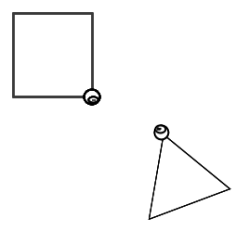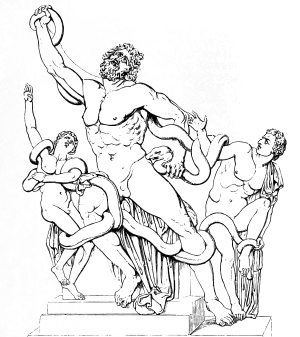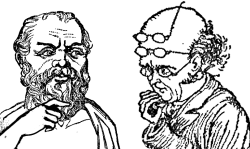 Wrong again: just last week I was saying that Roger Penrose’s arguments seemed to have drifted off the radar a bit. Immediately, along comes this terrific post from Scott Aaronson about a discussion with Penrose.
Wrong again: just last week I was saying that Roger Penrose’s arguments seemed to have drifted off the radar a bit. Immediately, along comes this terrific post from Scott Aaronson about a discussion with Penrose.
In fact it’s not entirely about Penrose; Aaronson’s main aim was to present an interesting theory of his own as to why a computer can’t be conscious, which relies on non-copyability. He begins by suggesting that the onus is on those who think a computer can’t be conscious to show exactly why. He congratulates Penrose on doing this properly, in contrast to say, John Searle who merely offers hand-wavy stuff about unknown biological properties. I’m not really sure that Searle’s honest confession of ignorance isn’t better than Penrose’s implausible speculations about unknown quantum mechanics, but we’ll let that pass.
Aaronson rests his own case not on subjectivity and qualia but on identity. He mentions several examples where the limitless copyability of a program seems at odds with the strong sense of a unique identity we have of ourselves – including Star Trek style teleportation and the fact that a program exists in some Platonic sense forever, whereas we only have one particular existence. He notes that at the moment one of the main differences between brain and computer is our ability to download, amend and/or re-run programs exactly; we can’t do that at all with the brain. He therefore looks for reasons why brain states might be uncopyable. The question is, how much detail do we need before making a ‘good enough’ copy? If it turns out that we have to go down to the quantum level we run into the ‘no-cloning’ theorem; the price of transferring the quantum state of your brain is the destruction of the original. Aaronson makes a good case for the resulting view of our probably uniqueness being an intuitively comfortable one, in tune with our intuitions about our own nature. It also offers incidentally a sort of reconciliation between the Everett many-worlds view and the Copenhagen interpretation of quantum physics: from a God’s eye point of view we can see the world as branching, while from the point of view of any conscious entity (did I just accidentally call God unconscious?) the relevant measurements are irreversible and unrealised branches can be ‘lopped off’. Aaronson, incidentally, reports amusingly that Penrose absolutely accepts that the Everett view follows from our current understanding of quantum physics; he just regards that as a reductio ad absurdum – ie, the Everett view is so absurd the link proves there must be something wrong with our current understanding of quantum physics.
What about Penrose? According to Aaronson he now prefers to rest his case on evolutionary factors and downplay his logical argument based on Godel. That’s a shame in my view. The argument goes something like this (if I garble it someone will perhaps offer a better version).
First we set up a formal system for ourselves. We can just use the letters of the alphabet, normal numbers, and normal symbols of formal logic, with all the usual rules about how they can be put together. Then we make a list consisting of all the valid statements that can be made in this system. By ‘valid’, we don’t mean they’re true, just that they comply with the rules about how we put characters together (eg, if we use an opening bracket, there must be a closing one in an appropriate place). The list of valid statements will go on forever, of course, but we can put them in alphabetical order and number them. The list obviously includes everything that can be said in the system.
Some of the statements, by pure chance, will be proofs of other statements in the list. Equally, somewhere in our list will be statements that tell us that the list includes no proof of statement x. Somewhere else will be another statement – let’s call this the ‘key statement’ – that says this about itself. Instead of x, the number of that very statement itself appears. So this one says, there is no proof in this system of this statement.
Is the key statement correct – is there no proof of the key statement in the system? Well, we could look through the list, but as we know it goes on indefinitely; so if there really is no proof there we’d simply be looking forever. So we need to take a different tack. Could the key statement be false? Well, if it is false, then what it says is wrong, and there is a proof somewhere in the list. But that can’t be, because if there’s a proof of the key statement anywhere,the key statement must be true! Assuming the key statement is false leads us unavoidably to the conclusion that it is true, in the light of what it actually says. We cannot have a contradiction, so the key statement must be true.
So by looking at what the key statement says, we can establish that it is true; but we also establish that there is no proof of it in the list. If there is no proof in the list, there is no possible proof in our system, because we know that the list contains everything that can be said within our system; there is therefore a true statement in our system that is not provable within it. We have something that cannot be proved in an arbitrary formal system, but which human reasoning can show to be true; ergo, human reasoning is not operating within any such formal system. All computers work in a formal system, so it follows that human reasoning is not computational.
As Aaronson says, this argument was discussed to the point of exhaustion when it first came out, which is probably why Penrose prefers other arguments now. Aaronson rejects it, pointing out that he himself has no magic ability to see “from the outside” whether a given formal system is consistent; why should an AI do any better – he suggests Turing made a similar argument. Penrose apparently responded that this misses the point, which is not about a mystical ability to perceive consistency but the human ability to transcend any given formal system and move up to an expanded one.
I’ll leave that for readers to resolve to their own satisfaction. Let’s go back to Aaronson’s suggestion that the burden of proof lies on those who argue for the non-computability of consciousness. What an odd idea that is! How would that play at the Patent Office?
“So this is your consciousness machine, Mr A? It looks like a computer. How does it work?”
“All I’ll tell you is that it is a computer. Then it’s up to you to prove to me that it doesn’t work – otherwise you have to give me rights over consciousness! Bwah ha ha!”
Still, I’ll go along with it. What have I got? To begin with I would timidly offer my own argument that consciousness is really a massive development of recognition, and that recognition itself cannot be algorithmic.
Intuitively it seems clear to me that the recognition of linkages and underlying entities is what powers most of our thought processes. More formally, both of the main methods of reasoning rely on recognition; induction because it relies on recognising a real link (eg a causal link) between thing a and thing b; deduction because it reduces to the recognition of consistent truth values across certain formal transformations. But recognition itself cannot operate according to rules. In a program you just hand the computer the entities to be processed; in real world situations they have to be recognised. But if recognition used rules and rules relied on recognising the entities to which the rules applied, we’d be caught in a vicious circularity. It follows that this kind of recognition cannot be delivered by algorithms.
The more general case rests on, as it were, the non-universality of computation. It’s argued that computation can run any algorithm and deliver, to any required degree of accuracy, any set of physical states of affairs. The problem is that many significant kinds of states of affairs are not describable in purely physical or algorithmic terms. You cannot list the physical states of affairs that correspond to a project, a game, or a misunderstanding. You can fake it by generating only sets of states of affairs that are already known to correspond with examples of these things, but that approach misses the point. Consciousness absolutely depends on intentional states that can’t be properly specified except in intentional terms. That doesn’t contradict physics or even add to it the way new quantum mechanics might; it’s just that the important aspects of reality are not exhausted by physics or by computation.
The thing is, I think long exposure to programmable environments and interesting physical explanations for complex phenomena has turned us all increasingly into flatlanders who miss a dimension; who naturally suppose that one level of explanation is enough, or rather who naturally never even notice the possibility of other levels; but there are more things in heaven and earth than are dreamt of in that philosophy.




